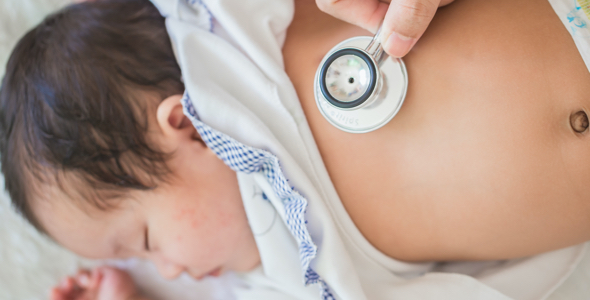By the bioMérieux Connection Editors
Maternal infections during pregnancy, also known as prenatal infections, can increase the risk of a preterm birth, and for serious heath complications in the newborn. Complications can include specific organ damage, developmental delay, and even death. Some prenatal infections can be tested for and treated, or steps can be taken to help prevent the spread of the infection from mother to child during pregnancy and labor.
Protecting the fetus and newborn from infection is crucial for the health of the child, and pregnant women can take additional steps to lessen their risk of developing some types of prenatal infections. Common infections that impact a woman’s pregnancy and the health of the baby can be viral or bacterial. Some of the most common infections that pregnant women are susceptible to which can significantly impact the newborn are cytomegalovirus (CMV), Group B strep (GBS), and listeriosis.
How is cytomegalovirus (CMV) spread?
About one in every 200 babies is born with a congenital CMV infection. About one in five babies born with the infection will experience health problems. CMV is passed from mother to child through the placenta. Expecting mothers can be CMV carriers or can be newly infected while pregnant. Young children carrying the CMV virus are more likely to spread it to expecting mothers than older children or adults. Reducing contact with saliva and urine from infants and young children can lessen your risk of getting CMV and passing it to your developing baby.
How do you get listeriosis?
Pregnant women are 10 times more likely to get listeriosis, a serious infection caused by eating contaminated food, than other people. The CDC recommends avoiding unpasteurized milk and products that are made from it such as cheese, ice cream, and yogurt to prevent listeriosis. They also recommend avoiding hot dogs and lunch meat unless they have been heated to an internal temperature of 165°F. Maternal symptoms of listeriosis include fever, fatigue, and nausea; however it can take 30 days or more for the first symptoms of infection to begin. Listeriosis can result in miscarriage, preterm delivery or infection of the newborn child.
How can you prevent Group B strep during pregnancy?
Babies can get very sick and even die if their mothers pass Group B strep (GBS) to them during childbirth. About 1 in 4 women in the U.S. carry the bacteria that cause GBS disease without any symptoms. The CDC recommends pregnant women get tested for GBS. Antibiotics can be given to the mother before childbirth to prevent the spread of GBS to the child.
Can STIs affect pregnancy?
Many sexually transmitted infections and diseases can be passed from mother to child during pregnancy and labor. Untreated vaginal infections such as chlamydia and gonorrhea are linked to preterm birth as well as eye infections and pneumonia in infants. These infections often have no symptoms, so it is important that women to get tested for them when planning for pregnancy.
Tips for Preventing Prenatal Infections
- Talk to your doctor about appropriate vaccinations.
- Talk to your doctor about screening tests for GBS and STIs.
- Avoid unpasteurized milk and unpasteurized milk products.
- Reduce contact with saliva and urine from babies and young children.
- Wash your hands often.
To learn more about preventing prenatal infections visit the CDC’s page, “10 Tips for Preventing Infections Before and During Pregnancy.”
Opinions expressed in this article are not necessarily those of bioMérieux, Inc.
This information is not intended to be a substitute for professional medical advice, diagnosis, or treatment. Always seek the advice of your physician or other qualified health provider with any questions you may have regarding a medical condition, diagnosis, or treatment.



